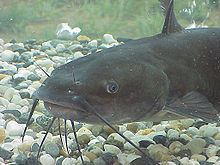 The Great Namazu
The Great NamazuAmerican Admiralty Books Safety & Privacy Policies EU VISITORS WARNING POSSIBLE COOKIES AHEAD
Greetings Bipeds!If one believes the report in the April 2016 issue of Journal of Physical Oceanography the Arctic Ocean is about to "spice up". In Physical Oceanographer parlance warmer saltier ocean water is considered "spicy" while cooler fresher water is considered "minty". This is something of an oversimplification, both would taste "salty" if given the human taste test but it serves a purpose for scientific discussion; Below is the abstract of the referenced paper :
"Abstract
The contemporary Arctic Ocean differs markedly from midlatitude, ice-free, and relatively warm oceans in the context of density-compensating temperature and salinity variations. These variations are invaluable tracers in the midlatitudes, revealing essential fundamental physical processes of the oceans, on scales from millimeters to thousands of kilometers. However, in the cold Arctic Ocean, temperature variations have little effect on density, and a measure of density-compensating variations in temperature and salinity (i.e., spiciness) is not appropriate. In general, temperature is simply a passive tracer, which implies that most of the heat transported in the Arctic Ocean relies entirely on the ocean dynamics determined by the salinity field. It is shown, however, that as the Arctic Ocean warms up, temperature will take on a new role in setting dynamical balances. Under continued warming, there exists the possibility for a regime shift in the mechanisms by which heat is transported in the Arctic Ocean. This may result in a cap on the storage of deep-ocean heat, having profound implications for future predictions of Arctic sea ice."
We think the operative word here is "possibility". Another set of operative words in the abstract consist of "under continued warming". In a nut shell the scientist writing this paper don't know for sure if the natural heat budget mechanisms that they describe actually work the way they theorize, and if they do, the changes they predict require continued warming. In fact global average temperatures ceased rising some years ago. That doesn't mean that such things shouldn't be studied by academics, or that monitoring of conditions should cease. But it is high time that climate alarmists in the Main Stream Media (MSM) cease seizing upon every academic paper that comes out theorizing on what might happen in little understood geophysical processes, if warming continues. "Climate change deniers" is a term invented by climate alarmist.
Here at the Namazu School of Climatology we believe that climates change, its what they do. Sometimes they change fast, indeed almost instantly, and other times very gradually. Human activity could drive climate change but so far all of the industrial exhaust since the dawn of the industrial revolution is less than the ash put into the atmosphere by the last eruption of Mount St. Helena, which did have a temporary effect on global weather. At the Namazu School we don't believe that periodic reoccurring weather cycles indicate a climate change. The fossil record indicates that climate incorporates many different short and longer term "weather cycles" varying in temperature, humidity, and precipitation. Interestingly the referenced paper above indicated that while an increase in "spiciness" of the Arctic Ocean might initially lead to more open water and less surface ice, continued "spiciness" could eventually lead to an increase in surface ice. Might the researchers simply have discovered the mechanism that drives fluctuations in surface ice coverage on the 5, 10, and 100 year cycles? Let's see, warming of average Arctic seawater temperatures leads to "spicier" water, which in turn leads to less surface ice, but if the condition continues for a protracted time, ice cover actually increases. Sounds like a weather cycle to us and not another reason to suspect dramatic climate change. But then again as a former demigod I can only base my observations and opinions on 3,000 years of experience. There are probably a good 50 years of actual comprehensive weather records for the High Arctic.
Namazu
Here at the Namazu School of Climatology we believe that climates change, its what they do. Sometimes they change fast, indeed almost instantly, and other times very gradually. Human activity could drive climate change but so far all of the industrial exhaust since the dawn of the industrial revolution is less than the ash put into the atmosphere by the last eruption of Mount St. Helena, which did have a temporary effect on global weather. At the Namazu School we don't believe that periodic reoccurring weather cycles indicate a climate change. The fossil record indicates that climate incorporates many different short and longer term "weather cycles" varying in temperature, humidity, and precipitation. Interestingly the referenced paper above indicated that while an increase in "spiciness" of the Arctic Ocean might initially lead to more open water and less surface ice, continued "spiciness" could eventually lead to an increase in surface ice. Might the researchers simply have discovered the mechanism that drives fluctuations in surface ice coverage on the 5, 10, and 100 year cycles? Let's see, warming of average Arctic seawater temperatures leads to "spicier" water, which in turn leads to less surface ice, but if the condition continues for a protracted time, ice cover actually increases. Sounds like a weather cycle to us and not another reason to suspect dramatic climate change. But then again as a former demigod I can only base my observations and opinions on 3,000 years of experience. There are probably a good 50 years of actual comprehensive weather records for the High Arctic.
Namazu
No comments:
Post a Comment